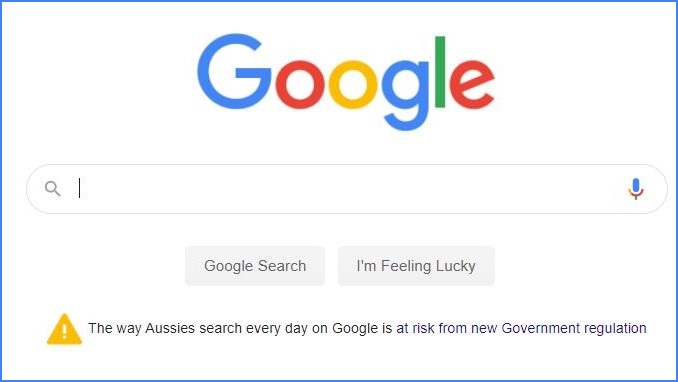Google is fighting back against proposed laws that would require it to pay news publishers for content and provide more transparency about how its ranking algorithm works.
In an open letter published on Monday, Google Australia Managing Director, Mel Silva, warned the proposed regulation “will hurt how Australians use Google Search and YouTube”.
“The law would force us to give an unfair advantage to one group of businesses – news media businesses – over everyone else who has a website, YouTube channel or small business,” Silva said.
“News media businesses alone would be given information that would help them artificially inflate their ranking over everyone else, even when someone else provides a better result.”
Google affixed a link to the open letter with a warning on the front page of its search engine which read, “The way Aussies search every day on Google is at risk from new Government regulation”.
Draft legislation released late last month would see market-dominant digital platforms like Facebook and Google enter bargaining agreements with news organisations to pay for news content shared through their services.
The legislation would also see Facebook and Google notify news organisations of any algorithmic changes that might affect how their content is ranked on different platforms.
Silva complained that the proposed laws would negatively affect Google’s users.
“We’ve always treated all website owners fairly when it comes to information we share about ranking,” Silva said.
“The proposed changes are not fair and they mean that Google Search results and YouTube will be worse for you.”
Google received a record fine from European regulators in 2017 after the European Commission found Google promoted its own shopping services ahead of its competitors “irrespective of its merits”.
The European Commission found Google’s behaviour was anti-competitive and said it had “a negative impact on consumers and innovation”.
In her open letter, Silva also warned Australians that their search data “may be at risk” under the new laws.
“You trust us with your data and our job is to keep it safe,” Silva said.
“Under this law, Google has to tell news media businesses ‘how they can gain access’ to data about your use of our products.
“There’s no way of knowing if any data handed over would be protected, or how it might be used by news media businesses.”
Under the draft legislation, use of the data shared between Google and news organisations would be restricted to bargaining purposes.
Personal data provided to any organisation operating in Australia is protected under the Privacy Act 1988.
Google is notorious for profiting heavily from the data it gathers from users, turning its search engine monopoly and personalised data mining into advertising revenue that accounts for around 75 per cent of parent company Alphabet’s total revenue.
The company has also been dragged to court by regulators for its treatment of personal data – including last month when the Australian Consumer and Competition Commission (ACCC) began a Federal Court case against Google for taking user data without their informed consent.
YouTubers will lose out
Google is also targeting its anti-regulation message to YouTubers.
Head of YouTube APAC, Gautam Anand, said in a blog post that the laws will “create an uneven playing field when it comes to who makes money on YouTube”.
“Through the YouTube Partner Programme, we already share revenues with partners who monetise on YouTube, including news publishers—and we are proud to support quality journalism,” Anand said.
“But through this law, big news businesses can demand large amounts of money above and beyond what they earn on the platform, leaving fewer funds to invest in you, our creators, and the programmes to help you develop your audience in Australia and around the globe.”
Indeed, Alphabet does use its revenue to pay YouTubers. Its latest financial report said this ‘traffic acquisition cost’ (TAC) comprised only 22 per cent of Alphabet’s advertising revenue last quarter.
YouTube regularly tweaks its recommendation algorithm to promote certain kinds of videos and has gone through phases of demonetising creators in order to sway large corporate clients.
Recently, the video platform has been deliberately sending people toward mainstream news media – what it calls “authoritative voices” – following reports about how the site sends users down rabbit holes toward political radicalisation.
“Authoritative news is thriving on our site,” YouTube boasted late last year.










